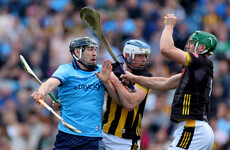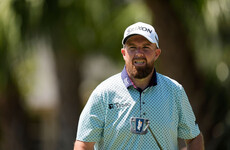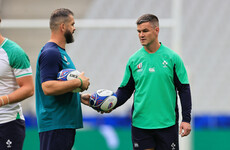PUT MARTIN ROWLANDS into a YouTube search and one of the results you’ll be presented with is a camera phone video taken by a spectator at a League One game between Brentford and Leyton Orient in January 2013.
Rowlands chuckles at the mention of it. He’s more familiar with the footage than Brentford supporters would like.
With the midfielder, who by then was in the autumn of his career, standing over an Orient free-kick, a section of the patrons at Griffin Park provided a charming soundtrack.
“ROWLANDS, YOU’RE A C**T! ROWLANDS, ROWLANDS, YOU’RE A C**T!”
Brentford’s axe to grind with Rowlands clearly hadn’t been blunted by the passing of a decade since he left the club for their West London rivals, Queens Park Rangers.
Their fans, baying for a failed attempt at goal that they could ridicule, were instead silenced by the sight of the ball nestling in the top corner of Simon Moore’s net.
“That goal was a long time after I left Brentford but the animosity was still there,” Rowlands recalls. “It’s still there now, to be honest. My cousins are Brentford fans and they tell me that they still hear silly songs being sung about me at their games. But listen, I just see it as a bit of fun. It doesn’t bother me.
“In that game, I remember that I was getting dog’s abuse. To get the ball and stick it in the top corner from 30 yards was a little bit of an ‘up yours!’ moment, definitely. The abuse had been really loud and then you could have heard a pin drop as soon as the ball went in. It was a lovely moment for me, I must admit.”
His acrimonious departure from Brentford hasn’t muddied Rowlands’ appreciation of the good times that preceded it. It’s the club where he got his start as a professional, before playing nearly 200 games over five seasons. It’s also the club where he first earned international recognition from the Republic of Ireland.
Rowlands was born in Hammersmith and raised in the shadow of QPR’s Loftus Road stadium. From early on, he was made aware of the family’s Irish connection, which emanated from his mother’s parents who hailed from Wexford.
In his pursuit of football as a profession, he was dealt an early blow that hadn’t been expected. When two years as an apprentice at Wycombe Wanderers didn’t culminate with the offer of a contract, he feared his career was over before it had begun.
“It was heartbreaking. I was devastated. I went home and cried, thinking my world was going to end,” Rowlands says of being shunted by Wycombe at the age of 18.
“I had a day of feeling sorry for myself, but the next morning my dad woke me and said ‘pull yourself together and go and show them that they made a mistake’. I felt I was more than worthy of getting a contract there, but I had to go out and prove that somewhere else.”
While foraging for opportunities to salvage his football career, Rowlands paid his way by working as a painter and decorator. Eventually, a part-time deal materialised at Farnborough Town of the old Vauxhall Conference.
“I was training at Farnborough twice a week, playing on a Saturday, and painting and decorating every other day. I was earning a living but still playing football with the dream of getting another opportunity.”
Before long, clubs higher up the food chain were taking notice of the manner in which an 18-year-old rookie was coping with the rigours of non-league football. Discussions were progressing with Southampton until his head was turned by interest from closer to home.
“When Brentford came in for me it was a no-brainer. It was local to where I lived and I have a lot of family who support the club. I also thought it’d be a better opportunity to play first-team football instead of going into reserve games, which turned out to be the case.”
After being impressed by his year in Farnborough, Brentford paid £45,000 to bring Rowlands into the Third Division (League Two). His first season at Griffin Park yielded 46 appearances, promotion and a first Ireland U21 call-up. The second was capped by winning the club’s Player of the Year award.
Although skilled when in possession, Rowlands also established a reputation as a player who guaranteed guts and guile. For that, he credits the brutal but beneficial education he received in places like Halifax, Kettering and Gateshead.
“I went straight from playing youth football with Wycombe to men’s football with Farnborough. It was brilliant,” he says. “You were only one step away from the Football League so it was really, really competitive. You had to be tough and you had to be on it or you’d get booted all over the place and bullied.
“Back in those days, it was different to how it is now. You had tackles flying in and I used to love that part of the game. In the Vauxhall Conference, playing against men in their 30s, you had to be tough or you’d fold. It was character-building stuff and it gave me a great grounding.”
At the end of Rowlands’ penultimate season at Brentford, he looked set to be the hero in their bid to be promoted to the First Division. Requiring a win at home to Reading, his goal on 51 minutes put them ahead.
However, thanks to a late equaliser from Jamie Cureton, it was the Royals who went up automatically. Forced to negotiate the play-offs instead, Brentford were beaten by Stoke City in the final.
A year later, Rowlands moved on after a season during which Brentford manager Wally Downes admitted that he and one of his key players “hadn’t seen eye to eye”.
In the summer of 2003, Brentford’s loss was their neighbours’ gain. For Brentford fans, leaving for Queens Park Rangers was a cardinal sin. Rowlands then compounded the enmity by referring to QPR as “a much bigger club” in an interview published by the Evening Standard on the eve of his first game against his former employers.
“Things turned sour with the Brentford fans and that interview is probably one of the main reasons. I basically stated facts: QPR is a bigger club and they looked after me better than Brentford did,” says Rowlands, who was recovering from a broken leg when Ian Holloway brought him to Loftus Road.
“Look, it’s water under the bridge now, but I didn’t feel I was treated very fairly towards the end of my time at Brentford – by management and the club in general.
“I had some great times there with some great lads. Brentford have gone on to do brilliantly and they’ve really established themselves in the Championship. They’ve got an opportunity to get promoted to the Premier League this year and they’re going into a fantastic new stadium. They’ve really progressed under their new ownership, so credit to them for that. Everything else is in the past for me.”
Rowlands spent nine seasons at QPR, the first of which still stands out as his most enjoyable. His Player of the Year contribution helped them to achieve promotion to the Championship, and Brian Kerr was on the phone within a couple of days.
On 27 May 2004, he came off the bench to make his senior debut for Ireland at Lansdowne Road. During the 1-0 friendly win over Romania, his introduction to the international stage was somewhat eclipsed by the presence of Roy Keane in a green jersey for the first time since the Saipan fall-out.
“Playing for Ireland was just massive for me. I had been called in previously by England for an U21 get-together in Italy under Peter Taylor. I went, and to be completely honest I never felt part of it. I came away not feeling great about the experience.
“When the opportunity to play for the Ireland U21s came I jumped at it and loved it. To then go on and play with the senior side was unbelievable. Roy Keane was my idol, someone I really looked up to, so to make my debut alongside him was incredible.
“I was very nervous, playing with top Premier League players like Roy, Robbie Keane, Duffer [Damien Duff], but everyone just made me feel so welcome so it wasn’t hard to settle in. To experience that after a great season at club level, it was just a fantastic year for me.
“Even now, I get goosebumps even talking about those times with Ireland. It was an amazing thing for me to experience personally, but that was also the same for people in my family. It was a huge source of pride, especially for my mum. My wife’s family are all Irish too so it was a big deal for them as well. I think we were all just immensely proud.”
Further caps followed during that international window in friendlies against Nigeria and Jamaica, but he had to wait four years for his next involvement with Ireland.
“I thought I had missed the boat,” says Rowlands, who was overlooked by Steve Staunton before being recalled at the outset of Giovanni Trapattoni’s reign.
He was included for a training camp in the Algarve in the summer of 2008, with Trappatoni singling him out for praise after a work-out against Portuguese club Portimonense.
“He has very good qualities, he’s quick, he’s aggressive in pressing,” the Italian said of Rowlands. “He is small, but I like – he did well.”
For Trapattoni’s first official outing as manager – a friendly against Serbia – Rowlands was lined up to start. In training two days beforehand, however, he sustained an ankle injury that created an opening for debutant Glenn Whelan, who never looked back.
There was more misfortune eight months later when Rowlands ruptured his anterior cruciate knee ligament while on duty with QPR. Nevertheless, he returned for the start of the 2009-10 season and Trapattoni was paying attention.
After coming on as a substitute in a 2-2 draw against world champions Italy that guaranteed Ireland a play-off to qualify for the World Cup, he started four days later against Montenegro.
With 38 minutes played in the goalless draw, he went into a challenge and felt a familiar sensation in his knee after catching his studs in the turf. The cruciate was gone again. After five caps, so too was his career as an international footballer at the age of 30.
“It was the same injury in the same knee I had already done so I knew instantly that I was in trouble again. Starting in a World Cup qualifier at Croke Park was a huge honour, but unfortunately it turned sour. It was a massive occasion for me but that’s what stands out when I think of it, which is a bit of a shame.”
A month later, Rowlands watched from his bed as Thierry Henry infamously denied Ireland qualification for the World Cup. There was scant consolation to be taken from the knowledge that his injury would have ruled him out of the tournament anyway.
“I had just had the operation so I was sitting up with my knee in a brace. Obviously I was behind the boys and we were cheated out of it. I wasn’t thinking of myself on any level at that stage, although I’m sure there would have been mixed emotions afterwards if we had qualified.”
By the time Rowlands returned to full fitness, he discovered that there were also implications for his career at club level. During his absence, Neil Warnock – with whom he says his relationship “wasn’t great” – took charge of QPR and reshaped the squad.
To Rowlands, it soon became clear that he wasn’t part of the new manager’s plans. Warnock oversaw the club’s return to the Premier League for the first time in a decade and a half, but instead of experiencing top-flight football, Rowlands had to seek game-time away from a club that he once captained.
During nine years at QPR, he was – and remains – a fan favourite. Having played out the remainder of his career with spells at Colchester United, Leyton Orient and Aldershot Town, he has been a regular visitor to Loftus Road since retiring in 2014.
“Even though it didn’t end great, I absolutely loved playing for QPR,” says Rowlands, who’s now an agent for a cohort of players that includes Ireland U21 international Conor Masterson.
“I feel very fortunate to have spent most of my career at a club that I grew up a stone’s throw away from. I was a lucky boy to experience what I did.”
The Premier League and a World Cup were once tangible prospects for a man who was discarded by Wycombe Wanderers, yet his experiences have taught Rowlands the importance of maintaining a sense of perspective.
“Every player can look back on different stuff and talk about what they could have done. Listen, I only look back on what I feel was a fantastic career that I absolutely loved.
“When I started that game against Montenegro, I was in midfield next to Liam Miller. I also played with a young boy named Ray Jones at QPR. They’re two lads who are no longer with us.
“When you put football in the context of what their families have gone through, it’s not difficult to feel happy with what you’ve achieved.”
The42 is on Instagram! Tap the button below on your phone to follow us!


















Super Spurs top of the league, the future is looking bright, roll on Liverpool!
Was there myself, they showed great character yesterday and are playing as a unit. Write Spurs off at your peril!
Great start for Spurs 6 pts and top of the table – QPR and the Hammers not the toughest start, but we lost 3 times to the latter last season. Cautiously optimistic, too early to be anything else …
Harry needs to get over it! He is where he is through his own fault and no one else’s.
Well in fairness if his dog hadn’t opened that bank account everything would have been ok.
Nacer Chadli woke up for once
Nacer Chadli woke up for once